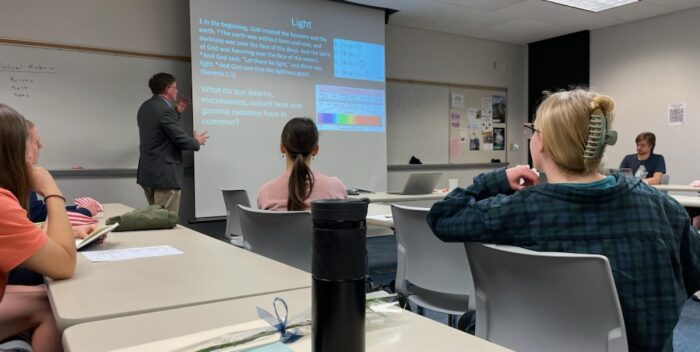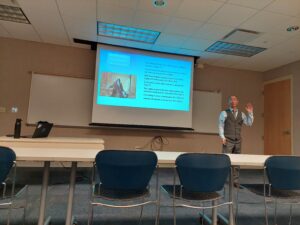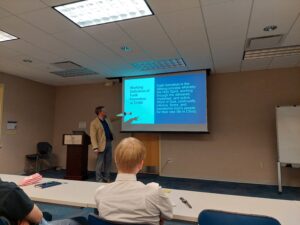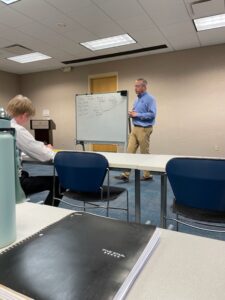“Behold, the New” event teaches Biblical engagement through different lenses
Dr. John Jurchen (middle) delivers his presentation on the Bible and the natural sciences.
Photo credit: Alison Galchutt
By Nora Betts and Alison Galchutt
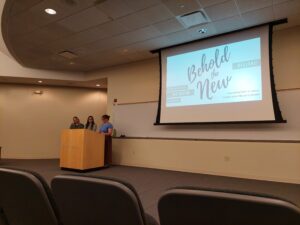
DCE Practicum students Ella Gilzean (left), Christina Gronefeld (middle), and Brianna Bianco (right) lead the opening of the Behold, the New event in Thom Auditorium. Photo: Nora Betts
Senior Director of Christian Education students showcased the meaning of biblical engagement in topics ranging from the natural sciences to music to fairytales in their “Behold, the New” event on April 15. The conference-style event featured presentations by 11 faculty and staff members that drew more than 50 students and fellow professors to the Thom Leadership Education Center for their choice of short speaker sessions.
The practicum event for DCE students was based on 2 Corinthians 5:17: “Therefore, if anyone is in Christ, he is a new creation. The old has passed away; behold, the new has come.”
Senior DCE student Abigail Baack said her class was intentional in reaching a wide audience as they brainstormed ideas for their final project.
“We had talked about how, in years previous, the practicum class had done things not really reaching the audience we wanted to,” Baack said. “It generally touched more of the church work people, and we wanted to reach a broader audience.”
Baack said the goal of the event was to allow students “to learn more about the Bible and see how their professors apply their faith so that they can reflect on their own lives.”
There were three 25-minute time slots, each with four speaker options. Attendees chatted, ate popcorn and sat in on the topics they found most interesting.
Senior Emily Loseke said she loved hearing about faith from “everyday people,” not just pastors and theology professors.
“I loved the opportunity to learn from everyday people,” Loseke said. “A lot of times, we speak about faith and theology and it’s like, ‘that’s a those kind of people thing; those people are the experts,’ when really, if you read the Word of God, you’re a theologian. If you’re a Christian, you have something to offer about faith and discipleship.”
Loseke said all the sessions she attended were great in different ways, and she wants the event to happen again.
New Reasons to Read Old Stories
Adjunct professor and data analyst/programmer in Concordia IT Department Billy Moore told his audience that everyone should read fairytales because they point to the Gospel message and truths about humanity.
“I would argue that all actual fairytales are the Gospel repackaged,” he said.
Moore highlighted the Brothers Grimm in the 1500s, who compiled fairytales that had been passed down through oral tradition. They maintained the essence of the stories and did not add their own modern morals or sanitize kid-inappropriate parts, which Moore said allowed them to record glimpses of universal truths.
“Jacob and Wilhelm Grimm were academics; they were linguists and teachers and they began collecting stories because they believed the fairytale was the purest and simplest expression of a people’s soul,” he said.
Moore said the Gospel message of Jesus’ salvation is clearly present in the fairytale of Briar Rose, also known as Sleeping Beauty. In the Brothers Grimm tale, the son of a king comes and saves the princess, triumphing where all others had failed and bringing the whole kingdom back to life with his arrival. In the same way, Jesus Christ, the Son of the King, saves his bride, the Church, and renews all of creation.
The Greek fairytale of Orpheus and Eurydice shows a rescue mission that only Jesus could fulfill perfectly, Moore said. Orpheus makes a deal with Hades and gets permission to lead his wife out of the Underworld as long as he does not look back, but he fails at the last moment and loses her. However, Moore said that Jesus is the perfect example of sacrificial love, who succeeds in bringing his people back to life and out of damnation.
“It takes nothing to recognize the Son of a King who is both God and man, descending into death and returning from the pit with his true love,” said Moore. “We know that where Orpheus failed, Christ did not.”
Blood, Water, and Light: Engaging Biblical Material through the Natural Sciences
Professor of Chemistry Dr. John Jurchen said that by studying and understanding the natural materials in God’s creation, people can gain a greater appreciation for how they are used in the Bible.
Jurchen posed a question to his audience: “Is it possible that we may be able to use the tools of the natural sciences to study the world that our Heavenly Father made and have maybe not more insight, but appreciation for the actual words that have been spoken in the Scripture?”
His answer was a resounding yes. For his presentation, Jurchen focused on three specific substances: blood, water, and light.
Regarding blood, Jurchen first pointed to the New Testament book of Hebrews, where blood is necessary for the forgiveness of sins. Jurchen specifically quoted Hebrews 9:22, which says, “Indeed, under the law almost everything is purified with blood, and without the shedding of blood there is no forgiveness of sins.”
He talked about how blood is a living substance and how when someone donates blood, they are literally giving their life to someone else.
Jurchen also explained that the use of water for baptism is fascinating because of its purpose of washing.
“Water is the universal solvent for universal washing,” Jurchen said. “And there’s nothing like it.”
Jurchen wrapped up his session by talking about light and how God said at creation, “Let there be light” (Genesis 1:3). Jurchen explained how light is in the eternal present, which means that, for the light God spoke into being at Creation, no time has passed.
“I went to John Jurchen’s [session] which was just fantastic,” Loseke said. “His enthusiasm was contagious, and it’s so cool how God put us in a world where we can study and understand and learn to appreciate the natural side that is interwoven into the Bible. There are so many layers of meaning that God put there intentionally.”
Ecclesiastes: Altering Our Reality
Kim Boyce, Concordia’s chief operating officer and psychology instructor, used the book of Ecclesiastes to contrast a person’s perceptions of the world and an overarching Christian perspective.
Perception is how a person thinks and feels, exemplified in the first 11 chapters of Ecclesiastes, where King Solomon vents about how he dislikes his accomplishments, belongings, and life. Perceptions are constantly changing and sometimes incorrect, like thinking that someone is calling your name.
“[Solomon] writes a book, and for 11 chapters he goes on and on and on about how things are meaningless,” said Boyce. “His perceptions were real, but by the time he gets to chapter 12, he starts to understand a perspective.”
Perspective is finding meaning in one’s thoughts and feelings. Ecclesiastes 12:13 says that the “conclusion of the matter” of life is to fear God and keep His commandments because He is the judge. Boyce said that the book of Ecclesiastes shows that, in a relationship with God, everything has meaning.
“When I’m reading the Bible, I read it like it’s an autobiography of God,” said Boyce. “That’s the whole reason we have God’s Word, to get to know the person of God. In a relationship with Him, everything from work to pleasure to study to relationships to the decisions that we make, it all has meaning in that context and that perspective.”
A biblical perspective means that life is difficult, but the objective of life is to glorify God and serve others.
Boyce used an analogy of a shoddy hotel room to describe a Christian’s perspective on earthly life. No one invests time and money into fixing up a hotel room because 1) it is not their home, 2) it is not their purpose, and 3) it is a temporary experience. Boyce said that Christians should recognize that God created them for eternal life in Heaven, not life forever in a sinful world. The job of a Christian is to be in relationship with God and to serve others, not to chase after “fixing” the world.
He encouraged his audience to read the book of Ecclesiastes in one sitting and think about specific perceptions about their lives that they can bring into a biblical perspective.
“We all have to know how the story ends, and Solomon writes the end of the story: fear God and follow His commandments,” said Boyce.
How Does God Actually Grow my Faith?
The Rev. Dr. Pete Jurchen, Concordia’s Assistant Professor of Lutheran Education and Faith Formation, explored two misconceptions and one right answer to the question: “what does faith formation mean?”
Faith formation is not a product, he said, in the same way that Confirmation is not a graduation from the church. Faith is not a complete thing to manufacture or check off a checklist.
Faith formation is also not a program, Pete Jurchen said. He warned against a cookie-cutter approach that creates a set of steps to reach an end goal of faith.
He said that faith formation is a lifelong process, where the Holy Spirit works in a person’s life and that person remains in God’s Word. He pointed to 1 Corinthians 3:5-11, where Paul writes that only God provides spiritual growth and that Christians continue to grow and mature over their lives.
“We can interrupt the growth by cutting ourselves off from the Word of God, from hearing it, from believing it, from living it,” he said.
Pete Jurchen said “abiding” in God’s Word through the Bible is both passive and active, and it is nurtured through individual and whole-church practices, including repentance, resisting temptation, and remembering one’s Baptism.
Faith formation informs a Christian’s worldview, forms one’s actions, and transforms one’s heart, he said.
Lifelong Spiritual Formation for Laity and Full-time Church Workers
LCMS Nebraska District President Richard Snow challenged his audience to consider their faith not just in terms of information, but as something that transforms their entire lives.
Snow asked his audience to consider the difference between learning and formation. He said learning can be a part of formation, but it is important not to just stop at learning. He said it is also important to leave time for reflection and curiosity.
Snow encouraged his audience to consider the Small Catechism question, “What does this mean?” Often, he said it is taken as “what do you think about this?” However, Snow said that if you look at the meanings of the Ten Commandments, you find words that involve action, not just thinking.
While people may often know what they should do, Snow said that people often struggle to put that information into action. Snow quoted Romans 7:19-25 as an example, in which Paul talks about the battle against the flesh.
The final thing Snow turned his audience’s attention to was prayer. He said prayer is more than just talking to God; it is having a conversation with God. Snow recommended leaving time for silence during prayer for reflection.
“I would suggest that this is one of our huge challenges, that we have given ourselves very little space to actually be quiet with the Lord and to ask what he wants from us,” Snow said.
“Everything is Ministry” Impact of Faith Cultivation in Business Setting
Therapist and adjunct counseling instructor Venita Steinbauer explored how she cultivated her faith in a business setting because “everything is ministry.” She said the Holy Spirit influenced how she interacted with people and how competent she felt in her work.
“For twenty years I worked in an office for two major organizations The Gallup Organization and Kenexa/IBM,” said Steinbauer. “The very nature of cultivating a relationship with Jesus impacted all of the interactions I had with clients and customers because it was a foundational part of my character and my guiding principles and my beliefs about people.”
“I went to Venita Steinbauer’s [session], talking about how the Holy SPirit works in everyday ways,” said Loseke. “It kind of catches you off guard, but it’s exciting to be a part of and to be open to that.”
What Jesus Did and Who He Is: LSB 438 & The Unprinted Stanzas
Professor of Music Dr. Elizabeth Grimpo explored the poetry of the hymn “A Lamb Goes Uncomplaining Forth,” including its unprinted stanzas. She encouraged memorization of the Lenten hymn to meditate on the sacrificial love of Jesus.
Religious Freedom and Biblical Engagement: God’s Word as Our Guide
Dr. Keith Kerschen, Associate Professor of Education and Director of Education Data and Assessment, spoke about religious freedom and biblical engagement. He highlighted the Lutheran Center for Religious Liberty and the resources they offer to help Christians stay informed on key issues.
Healing Through Listening
The Rev. Daniel Lewis, visiting professor of theology, focused on the importance of listening to remedy problems like isolation and disconnection. He said that college students are constantly surrounded by people and noise, whether in their dorms, in the dining hall, online, or otherwise. If people feel alone with their problems despite the noise all around them, “healing starts with listening,” Lewis said.
Winning the Inner Battle
Bulldog men’s basketball coach Ben Limback taught his audience to find inner victory in God despite surrounding opposition. He focused on Psalm 23:5, which reads, “You prepare a table before me in the presence of my enemies; you anoint my head with oil; my cup overflows.”
“We will explore how actively recognizing this prepared ‘table’ in our daily lives cultivates a mindset of abundance and security, directly countering the Enemy’s lies of insignificance, envy and fear,” Limback said.
Rooted in the Word
Associate Professor of Education and Elementary Education Director Dr. Shanna Opfer shared how a “Read the Bible in a Year” plan deepened her understanding of Scripture and guided her roles as a wife, mom, daughter, and professor. She explored several types of Bible reading plans and encouraged her audience to choose one and set goals that fit their season of life.


